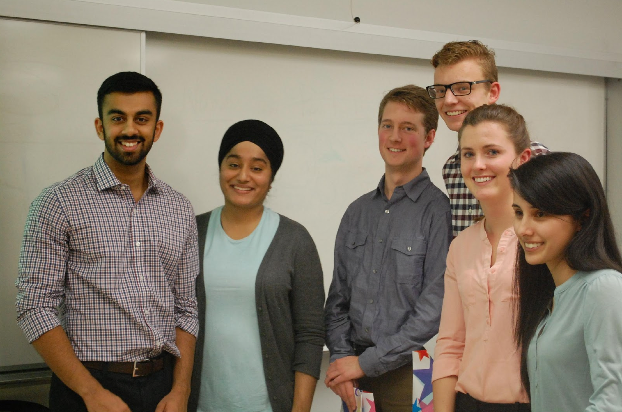By Glen Ess (The Cascade) – Email
On Thursday, November 26, UFV’s pre-med student alliance (PMSA) hosted a presentation by six UFV alumni who, upon reaching the end of their UFV studies, were accepted into UBC’s medical program. Over the course of an hour they covered a wide range of topics, from describing the (new) curriculum, to the application process, to just a general recapping of a regular day in the life of a med student.
The presentation, an annual event for the PMSA, drew a crowd of about 50 students to B132 on UFV’s Abbotsford campus, filling it to capacity. Between the food and drink, and the casual, conversational tone taken by the presenters, it was an engrossing evening. According to both PMSA president Aneet Baines and vice-president Vivienne Beard, the panel is usually the group’s most highly attended event. Beard has been involved in the past three iterations of the event, and said the event has seen steady growth.
It was easy to see why. The presenters, having only recently left UFV, could easily relate to the current class of UFV med-school hopefuls and engage with them as peers. Over the course of their group presentation, they stressed the fact that, with the determination and ambition to do so, anyone can make it to med school, but that grades alone wouldn’t be enough to grant them entry. As the presenters put it, “There’s no formula to getting into med school,” and the wide variety of disciplines represented by the presenters and their UBC classmates is testament to this. Given that a medical profession is one that requires a tremendous amount of study and training, it’s easy to fall into the mindset that grades are the sole factor in deciding if a student is deserving of entry into medical school. This is an easy mistake, they reiterated, because extra-curricular activities are just as important, both to med-school applications and to becoming a well-rounded individual.
After firmly drilling home the importance of extra-curriculars and a rundown of the application process, they began to describe the way UBC’s medical program runs on four separate campuses, with an extreme dedication to providing students with hands-on experience; students are assigned to clinics all over the Lower Mainland to practice clinical skills, as well as being assigned a fake patient every week for diagnosis. They also went into extra detail on their daily schedule: eight-hour days full of challenging, time-intensive, large classes, and, to paraphase the presenters, “optional instructional sessions that you pretty much need to go to” — and little in the way of free time or extra sessions for studying.
To summarize, med students are busy. Very busy. However, it seems that while med students are incredibly busy, they also find a great sense of fulfilment in what they do.



